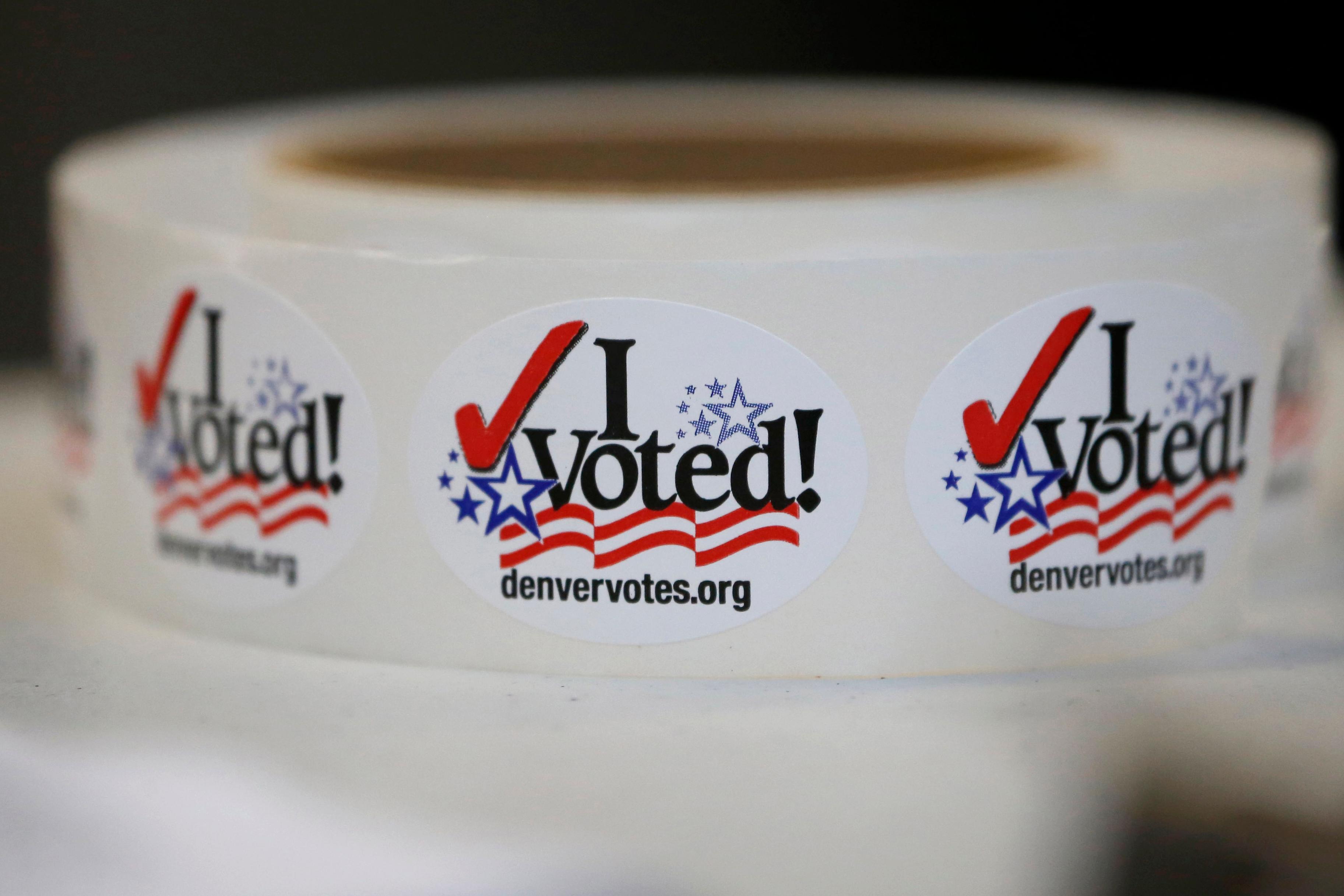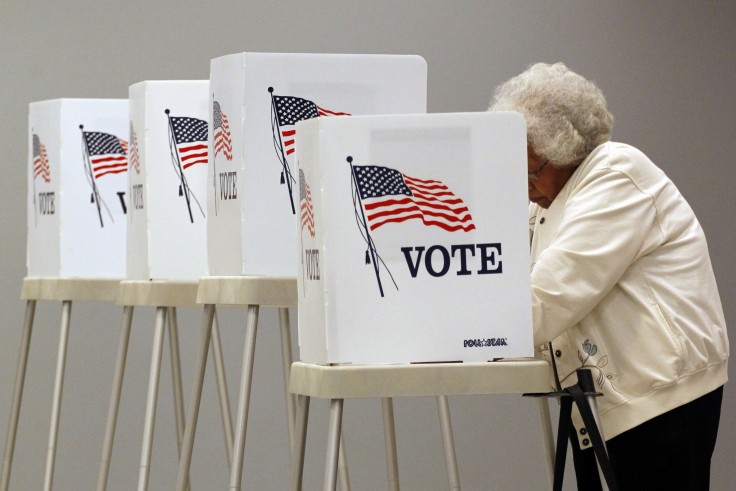

Slavery is banned in Colorado with one exception, for the "punishment of a crime." Article II, Section 26 says: “There shall never be in this state either slavery or involuntary servitude, except as a punishment for crime, whereof the party shall have been duly convicted.”
This election, Colorado voters will decide whether to strike that clause from the state constitution. The ballot measure is called Amendment T, or the "No Exception To Involuntary Servitude Prohibition." It was referred onto the ballot after passing through the state House and Senate unanimously last spring.
Several community and religious organizations support the ballot initiative. Gov. John Hickenlooper has expressed support for it, and recently, the American Civil Liberties Union of Colorado (ACLU) encouraged people to vote yes on Amendment T in a blog post.
There is no organized opposition, according to the ballot analysis in the Colorado Blue Book. Though unnamed opponents have expressed concerns that striking the language could amount to legal uncertainty around inmate work programs and court-ordered community service.
Will Dickerson is with Together Colorado, a nonpartisan, multi-faith community organization leading the Yes On T Campaign. Melissa Hart is the Schaden Chair and professor of law at University of Colorado Boulder. She directs the school's Byron R. White Center for the Study of Constitutional Law.
Dickerson and Hart spoke with Colorado Matters host Nathan Heffel.
Listen to other conversations about 2016 ballot measures:
- Debate: Colorado Voters To Decide On Universal Health Care
- Debate: Should Voters Make It Harder To Amend Colorado's Constitution?
- Debate: Coloradans Will Vote On Medically Assisted Death Proposal
- Debate: Coloradans Will Vote Whether To Create Open Presidential Primaries
- Debate: Should Coloradans Vote To Raise The Minimum Wage?
Click on the audio above to listen to the full conversation. And read the transcript below:
Nathan Heffel: This is Colorado Matters from CPR News. Iím Nathan Heffel. Slavery is banned in Colorado with one exception for the punishment of a crime. This election Colorado voters will decide whether to remove that provision from the stateís constitution. There is no organized opposition to the ballot measure, Amendment T, so youíll not hear a debate today. Joining us is Will Dickerson with Together Colorado, a multi-faith organization, leading the YES on T Campaign and Melissa Hart Director of the Byron R. White Center for the Study of Constitutional Law at CU Boulder. Welcome to you both. Will Dickerson: Thank you. Melissa Hart: Thank you. NH: The Colorado constitution currently states quote: “There shall never be in this state either slavery or involuntary servitude except as a punishment for crime whereof the party shall have been duly convicted.” A “yes” vote on Amendment T would strike that exception from the constitution. Will, why do you think itís important to get rid of these 14 words? WD: Yeah, so for me it's really important for us to really reflect values so we believe that words matter, right. And when I think about the idea of slavery, the legacy that it holds, the death, and the hurt, and the pain, the violence that was inflicted upon particularly African-Americans during that period of time, there is a long-lasting pain that sits in that. And so I don’t believe that the state that I grew up in, that I live in, that I’m from, actually has the values. Like I know the state well, I know the people well and I don’t believe that we have the values of having slavery under any circumstances whatsoever and so I believe this is a really easy vote for folks. NH: So is this a largely symbolic thing for you or is it something more as well? WD: Well, in some ways it’s symbolic, right, in other ways I think it raises the question for people on what we actually believe, what our constitution reflects and I think it raises the consciousness of people around, like what does it mean to enslave people, what does it mean to have that kind of writing in the constitution? It’s a question that should be raised in our hearts, I think. NH: And the language was written in 1876 into our constitution; it appears in our ratified constitution Article II, Section 26 from that time on. I understand you learned about the clause while working with a colleague on research around mass incarceration. You first discovered it in the U.S. Constitution and then in Colorado’s. What was your initial reaction? WD: Yeah, so for both of us, the colleague you’re talking about is Jumoke Emery, he’s a really good friend of mine, a brother of mine, and when he brought it up it was, I was angry about it at first and then I really had this reaction of sadness as well. And so for me it really lit a fire under me around what can we do to get this removed and what can we do to get us moving into the 21st Century. And Jumoke led those efforts in the beginning and did a great job did all the research and all the hard, hard work of this. NH: The ballot question that you put forward was not brought by a citizen’s initiative, but was referred to the November ballot after the proposal passed through the state legislature. How did the issue get on the lawmakers’ radar? WD: Yeah, so that falls with Jumoke Emory as well. So he was a community organizer that was working with Together Colorado at the time and, like I said, he was doing a lot of research. He was sitting down with a lot of senators, representatives and finally we came to [State] Senator Jessie Ulibarri. NH: From Adams County, a Democrat. WD: Yes, exactly and he was really excited about it. He said, “Yeah, I think I want to work with you all to get this thing passed through. I think it’s time.” NH: Melissa, help us understand the history behind this language. It’s written nearly verbatim in the 13th Amendment of the U.S. Constitution. It’s still there and that amendment was added on at the end of the Civil War. Why was that provision included at that time? MH: So, that’s right. There are a number of different reasons that that provision was included. It actually was taken directly from the Northwest Ordinance, which is the agreement that determined how the Western territories and the United States would be added as states moving forward. So it dates back long even before the Civil War, that all of the states that were added out of these Western territories were non-slave states by law, but they included this provision that they were non-slave states except as a condition, except as punishment for a crime and that there was sort of a moral judgment there that hard work was essential to moral rehabilitation which was part of what we were trying to do. At that time there was a view that you could rehabilitate people who had been convicted of crimes so that was a piece of it. Although, when you look at the history following the Civil War that moral, positive moral judgment was accompanied, particularly in the Southern states. But it really all over the country by a sense that, that this punishment as for a crime could be used essentially to replace slavery as a way to ensure ample free labor and really oppression of black people again, particularly, in the South. So that you look at the time during and after reconstruction there was really, there was mass incarceration at that time, too, and convicts were a source of free labor to replace the free labor that had been slavery. NH: So why would that language not be revisited and revised years later? Why is it still in our U.S. Constitution and in a number of [state] constitutions across the country? MH: Right, right. Well, I think there are a couple of different reasons. A lot of people aren’t aware that it’s there so some of it is raising awareness is the first step to changing something like this and that’s part of what I think Together Colorado is doing. This is an issue that’s really coming up all over the country as well. There are other states talking about it. But I think there’s some, although there’s not opposition to it that’s vocal and active, the truth is that it’s still true today that convicts are a source of very cheap labor in states all over the country and there may be resistance to changing it because of the possibility that that will change as well. NH: This measure comes at a time that prisoners, like you said, around the country are sometimes striking, asking for fair wages. The economic yield of federal and state inmates is around two billion dollars per year, and that’s according to estimates from the Prison Policy Initiative. NH: You’re listening to Colorado Matters from CPR News. We’re discussing Amendment T, the ballot measure proposes removing language from Colorado’s constitution that allows slavery to be used for a punishment for a crime. Joining me today are Will Dickerson, from the community organization Together Colorado and Melissa Hart, who teaches and studies constitutional law at CU Boulder. As I mentioned there is no organized opposition to this measure, but this ballot analysis says that you’ll find that, of course, in the Colorado Blue Book that opponents were concerned about striking the language and that it could amount to legal uncertainty around inmate work and community service programs. We reached out to the Colorado Department of Corrections. The DOC says it does not have a position on Amendment T and that work programs are quote “designed to provide offenders with valuable skills to enhance their employment prospects when released and are entirely voluntary.” NH: Will, how do you respond to the notion that a yes on T could raise questions about the legality of these programs? WD: Yeah, so in the research that we, you know, that we had carried out in the very beginning of this and the conversations that we had with the legislature, our legislators, really brought us to the conclusion that in terms of the work itself of removing the language that it wouldn’t actually impact anything that prisons are doing as of right this moment. This is about like removing the language itself. If you read this, right, the language itself is saying that there’s an exception for slavery. And regardless about what you believe about how people who have been incarcerated should be punished or whether or not you believe that there should be rehabilitation or all those different pieces, is irrelevant to the fact that in our constitution the language reads in such a way that at any moment of any time a person could decide that they want to enslave somebody based around those things. So not necessarily that, the conversation could be had that that is happening already, but even if you donít believe that, we were really pushing on this idea that we want to remove it because we don’t ever want that to be even an option. NH: Melissa, as someone who studies and teaches constitutional law what do you think about that? MH: I think that Will started out by saying words matter and I do think both as a law professor and then I do a lot of work with high school students, and I’m a mom of two middle school kids, and every time we have the conversation across all of those ages about the fact that our U.S. Constitution still includes all of the original provisions -- valuing black lives at three-fifths rather than a full life, and the 13th Amendment still includes slavery but slavery was, in fact, was not abolished, it was mostly abolished but not entirely abolished -- I find that the kids thinking about it and talking about it see that that’s wrong. It’s really problematic. It does feel like it’s a statement about who we are as a people. So I think that there is some value to really separating the questions of what will happen, the conversation about work in prison is going to go on, it’s going on now with this language there, but taking that moral stand and saying this language is not who we are and what we want to be I actually think has a lot of value. NH: And I think it is fair to say that the cultural and symbolic implications here aren’t in question. But could one see, Will, that maybe removing of this language could put court-ordered community service or doing something as opposed to paying a fine into question? WD: Yes, so the way you asked that question is interesting so I would say, yeah, someone could look at it that way and I think that that’s why the Blue Book itself has that kind of written in into it in terms of being like at least some kind of opposition that there is a, there could be a question around that. All the study that we’ve done really shows that the language itself and it being removed doesn’t actually impact anything, right, in that particular way. Again, it raises questions and raises opportunity for people to have a larger conversation about this, but removing it actually wouldn’t change any of those things and I think Vermont, particularly, gives a perfect example of that. Vermont being the only state that never put in the exception for slavery so they have, they do have the slavery amendment it just doesn't have an exception in it. NH: And in Vermont, community service and work programs are used in state prisons there and in 2014 Vermont had an incarceration rate that is nearly 40 percent lower than the national average. That’s according to data collected by the National Institute of Corrections. If voters choose to strike this from the Colorado constitution, it’s still in the U.S. Constitution. What does this mean? MH: Well, it means that we, it means that we haven’t gone back and revisited whether we think that this is what we want our Constitution to look like. I have to say it’s so hard to, it’s so easy to amend the Colorado constitution and so hard to amend the U.S. Constitution but it would clearly be an uphill battle of a great magnitude to think about removing this language from the U.S. Constitution and that would be a larger national conversation. But it’s one that, again, I think people like Will and people in other states around the country are really starting as part of a larger question about how we want to relate to that history of slavery. NH: And several other community organizations and religious communities support this initiative. Governor Hickenlooper has said he supports it and recently the American Civil Liberties Union of Colorado, or the ACLU, in a blog post encouraged people to vote yes on Amendment T. Will, let’s get kind of philosophical for a little bit. You’ve mentioned that this cause has racial implications. So if it passes in November what kind of impact do you hope this will have? WD: Yeah, so from a racialized standpoint, okay. So I think that this, again, this has to do with like healing racial divides. And I think that one of the ways that it does that is it starts to have a conversation with people that’s like just sitting on the surface right now in our country about race and about people how about people feel about race. And I think that folks just all around are suspecting each other. And statements like this and Colorado making this decision to like remove the exception for slavery is an opportunity for folks to say, well, maybe everything that I believe about folks that are in this state isn’t completely true and maybe there is some hope that we as people can come together and do something around race that is positive and that is important to so many people in this state. I have a leader that I work with whose mother is over 100 now and the leader, her name is Sister Lee McNeil, she’s at Shorter A.M.E [in Denver]. she often tells this story about her mother being just two generations from slavery and like hearing the stories about slavery and being so close to that. So I think that one of the things that she says is this would mean so much to her mother who’s over 100-years-old being, African-American woman who is just so near to slavery so. NH: Will, Melissa, thanks so much for joining us. MH: Thank you for having us. WD: Thank you. |








